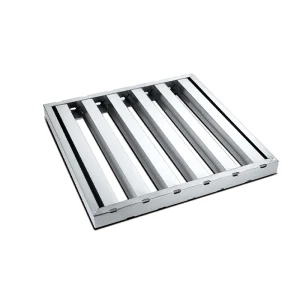5 Days a week from 8:30 am to 5:30 pm
Grease Filtration Explained: Baffle Filters or Mesh Filters?
Selecting the perfect grease filter can enhance your kitchen’s air purity and security. Baffle and mesh filters lead the industry, each providing distinct perks for grease filtration. This article explores their operations, advantages, and drawbacks. It also compares them directly. Plus, we’ll emphasize why SIMPLE is a preferred provider of excellent grease filters, aiding your decision for the ideal fit.
What Are Baffle Filters and How Do They Work?
Baffle filters are essential in contemporary kitchens, valued for their effectiveness and sturdiness. Let’s examine their core aspects.
Design and Structure of Baffle Filters
Baffle filters boast a sequence of overlapping metal strips, usually crafted from stainless steel or aluminum. These strips create a winding route. Air must curve and shift as it moves through. This smart layout captures grease efficiently while preserving ventilation.
Mechanism of Grease Filtration in Baffle Filters
When oily air travels inside, the abrupt bends force heavier grease bits to hit the strips. The grease then slides into a gathering basin. This method reduces accumulation in pipes. As a result, it boosts safety and lowers fire dangers.
Advantages of Using Baffle Filters
- Great Effectiveness: Traps big grease bits skillfully.
- Fire Protection: Flame-proof materials cut down risks.
- Simple Upkeep: Dishwasher-friendly and easy to care for.
- Longevity: Made to endure tough conditions.
Potential Drawbacks of Baffle Filters
- Greater Expense: Costs more initially than mesh options.
- Ventilation Challenge: May need stronger blowers due to added force.
- Heaviness: Bulkier, so fitting them can be harder in certain arrangements.
What Are Mesh Filters and How Do They Operate?
Mesh filters present a light, cost-effective choice. Here’s how they perform.
Construction and Materials Used in Mesh Filters
Mesh filters include several tiers of thin metal netting, often aluminum or stainless steel, secured in a holder. This tiered setup forms a web-like pattern. It catches grease from the breeze passing through.
Process of Grease Filtration in Mesh Filters
Oily air flows across the netting layers. Oil specks get stuck in the small openings there. Cleaner air escapes afterward. Yet, some grease might stay if cleaning isn’t regular.
Benefits of Using Mesh Filters
- Budget-Friendly: Cheaper upfront than baffle types.
- Light: Simple to lift and set up.
- Solid Airflow: Less opposition to breeze than baffles.
- Flexible: Fits well for milder cooking tasks.
Limitations of Mesh Filters
- Blockage Chance: Grease piles can halt airflow if ignored.
- Fire Risk: Caught grease raises burning potential.
- Regular Care: Needs steady attention to remain useful.
How Do Baffle Filters Compare to Mesh Filters?
Let’s match these two across vital factors.
Efficiency in Capturing Grease Particles
Baffle filters shine at grabbing bigger grease specks, thanks to their active airflow pattern. They often hit 90% success with the right speed. Mesh filters nab smaller bits. However, they might let more grease slip if blocked, falling under 80% over time.
Maintenance Requirements and Cleaning Ease
|
Filter Type |
Cleaning Schedule |
Ease of Upkeep |
|
Baffle |
Every 3-4 weeks |
Dishwasher-safe, quick wipe |
|
Mesh |
Weekly or biweekly |
Needs soaking, brushing |
Baffle filters triumph with less upkeep. Meanwhile, mesh filters call for more routine effort.
Durability and Longevity of Each Filter Type
Baffle filters, like SIMPLE’s BH223, outshine mesh ones in lifespan. Their rust-proof materials help them endure. Mesh filters fade quicker, especially in greasy spots.
Suitability for Different Kitchen Environments
- Baffle Filters: Perfect for intense commercial kitchens or homes with lots of frying.
- Mesh Filters: Suited for relaxed home use with gentler cooking needs.
When Should You Choose a Baffle Filter Over a Mesh Filter?
Your kitchen’s demands shape the top pick. Here’s how to figure it out.
Factors to Consider for Commercial Kitchens
Commercial spaces flourish with baffle filters. Lots of grease from frying or grilling needs their top-notch filtration and fire protection. Their toughness also trims future expenses, even with a steeper starting price.
Residential Kitchen Applications
For home chefs, mesh filters usually work for rare use. Still, if you enjoy stir-fries or deep-frying, a baffle filter like SIMPLE’s BH224 delivers stronger results and calm.
Why SIMPLE Is a Trusted Supplier for Grease Filtration Solutions?
For grease filters, SIMPLE rises as a dependable ally.
Overview of SIMPLE’s Product Range
SIMPLE provides a varied assortment, from heavy-duty baffle filters to handy home picks. Visit their product center to see choices like the fuss-free BH225. It’s built for performance and ease.
Commitment to Quality and Innovation in Grease Filtration
Since starting, SIMPLE has aimed for top-tier kitchen tools. Their grease filters mix toughness, modern style, and practical traits. This ensures peak results for both business and home kitchens.
Conclusion: Picking the Right Grease Filter for Your Kitchen
Baffle and mesh filters each glow in unique situations. Baffle filters top in effectiveness, safety, and lifespan—great for heavy grease zones. Mesh filters bring affordability and simplicity for lighter tasks. No matter your needs, SIMPLE offers prime choices to keep your kitchen air fresh and secure. Browse their selection now and boost your filtration setup!
FAQs About Grease Filtration
What Is the Lifespan of Baffle Filters and Mesh Filters?
Baffle filters can persist 5-10 years with good care, due to robust materials. Mesh filters generally last 1-3 years, based on use and upkeep.
How Often Should Grease Filters Be Cleaned?
Baffle filters require cleaning every 3-4 weeks in active kitchens. In homes, it’s less often. Mesh filters need it weekly or biweekly to avoid jams.
Can Baffle Filters and Mesh Filters Be Used Interchangeably?
Not quite. Baffle filters demand higher airflow speed. So, switching them into a mesh setup might lower effectiveness. Check your hood’s details first.



